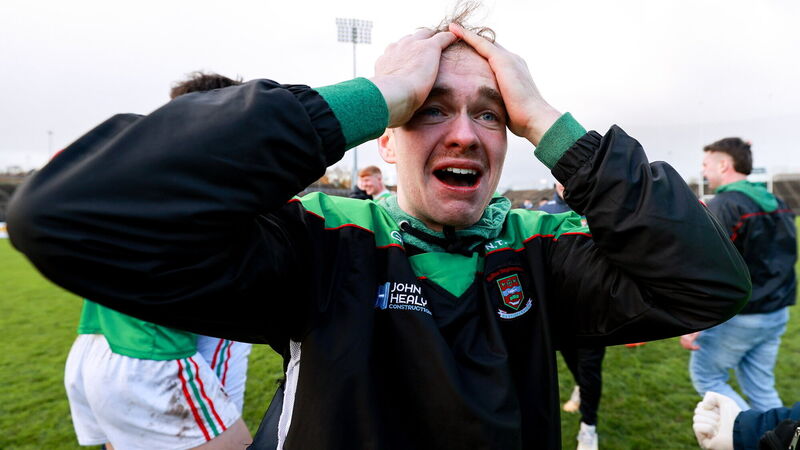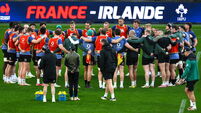Christy O'Connor: The manic nature of football's thrilling momentum switches

Ballina had scored just 0-7 by the 49th minute of the Mayo SFC final against Westport but would outscore their opponent 2-6 to 0-1 in the remaining minutes. Pic: Thomas Flinkow/Sportsfile
With ten minutes remaining in the Mayo SFC final replay on Saturday in MacHale Park, Westport were ten points ahead of Ballina Stephenites and apparently cruising to a second county title in their history. And then, in a flash, a match that Westport had controlled exploded in a fireball and Westport were burned alive by the Ballina backdraft.
Ballina’s cause looked hopeless when they’d been so lifeless and listless for so long. They only had 0-7 on the board by the 49th minute until igniting into that blaze and outscoring Westport 2-6 to 0-1 across the remainder of the match.
Westport were without the steadying and experienced head of Lee Keegan, who'd been injured in the drawn game, while they really felt the loss too of Eoghan McLaughlin, who went off injured with 11 minutes remaining.
The game jack-knifed with goals from Evan Regan and Dylan Thornton before Regan landed a two-pointer and the winning point within seconds at the death to fire Ballina into dreamland and stun Westport into a state of disbelief.
It's been a theme across the latter stages of the club championships. Two weeks ago in the Armagh semi-final, Cullyhanna trailed Crossmaglen Rangers by 0-9 with ten minutes remaining before scoring an unanswered 0-10 to shock an ultra-experienced side that had contested four of the previous five finals.
Club is different to inter-county but there have been patterns in the latter stages of the club championship with the early rounds of the national league, where football often resembled hurling, where leads that would have been previously deemed unassailable were suddenly surmountable. It wasn’t as if teams were being mugged either; everyone could see the assailants coming – they just couldn’t stop it happening.
The tendency for teams to surrender the initiative is more likely to happen in the lower divisions but it was consistently occurring across Division One. In ten of the 28 games in the top division, there was a turnaround of ten points or more.
Much of those early spring trends were intertwined with the adverse weather, but the new rules have made still made it much harder to arrest and stall momentum. Two-pointers have reduced the propensity for teams to get far enough ahead anymore to stay safe.
The change to the kickout rule has been key because teams under the cosh can no longer take a short kickout to a corner-back, who can then kick it back to the ‘keeper to try and hold onto possession. Yet most of the new rules have created an environment for momentum to move inexorably in one direction. The manic nature of a momentum switch within that new environment has also taken away the potential for opposition coaches and players to try and control that chaos and disorder.
There has also been a clear pattern to those trends with the weather, as there was from mid-March on at inter-county level. The tweaking with some of the rules after round 5 of the league was a factor but there weren’t any 10-point turnarounds in Division One in the last two rounds. And, outside of Kerry’s devastating 0-14 burst in ten minutes against Armagh in the All-Ireland quarter-final, and Galway’s 2-3 blitz in five minutes against Meath on the same afternoon, it wasn’t really evident late on during the championship either.
Club is a different level but there have been multiple examples of those wildly oscillating momentum shifts recently. And as Ballina showed again on Saturday, when the momentum turns, anything is possible.
When Jordan Kissane scored a point for Austin Stacks early in the second half of the Kerry county final, the construction of the score had a twin message for both teams; it underlined everything Stacks hoped they might be able to do, but it also reaffirmed what Dingle couldn’t allow them to do.
After securing possession off their own kickout, Stacks held onto the ball for 4 minutes and 57 seconds. It was brilliant game-management from Stacks against the breeze but it was a wake-up call for Dingle around being even more aggressive in the tackle and not letting Stacks control the clock and momentum from that early out.
There were stages in that second half when Stacks just seemed able to assert that greater control. On two occasions midway through the half when Dingle reduced the margin to one, Stacks pushed it straight back out to two each time off their own kickout.
Gradually though, Dingle began to dial up the heat. And they really turned the screw in the fourth quarter. In that period, they forced five turnovers in possession, with Dingle sourcing 1-3 from turnovers in that same timespan. And they nailed 2-4 from eight shots in that fourth quarter.
Dingle’s long ball tactic worked smartly too as it was the launchpad for their two goals, both of which were brilliantly finished by Paul Geaney. It was a day of days for Geaney who finished with 2-2 and two direct assists.
After the heartbreak of last year’s county final defeat, when they fell apart in the last quarter against Dr Crokes, Dingle made sure that those lessons had been learned. And that this time, the cup was definitely going west.
Déjà vu for Na Fianna. Big time. They should have lost last year’s Dublin county final against Kilmacud Crokes but they didn’t, stealing the match with an additional time goal. They should have lost Saturday’s night’s final too against Lucan Sarsfields, but they didn’t, winning the game in the dying seconds of additional time with a point from Seán Currie. Déjà vu, for sure.
Being All-Ireland champions does infuse a team with huge reservoirs of confidence and belief but it’s still been a testament to Na Fianna that they’ve been able to win so many tight games in the last 12 months.
“We’ve just learned over the last two years that we’re never gone,” said Brian Ryan in his post-match TV man-of-the-match interview. “We had no right to win that game. Lucan were just on top of us but we find a way to win.” They do. Na Fianna’s hardest battles in those last two years have been in Dublin. They only escaped with their lives after extra-time against St Vincent’s in last year’s semi-final. They could easily have lost this year’s quarter-final against Cuala too after extra-time. And Saturday night was another massive jail-break.
Winning the three-in-a-row was elation for the All-Ireland champions but this was absolute heartbreak for Lucan who were agonisingly close to securing a first senior title. Na Fianna had eight more shots (38-30) but Lucan were the better team.
Their economy and efficiency was higher. Seánie McClelland gave a puckout exhibition in the first half, when his side mined 0-7 from the Lucan goalkeeper’s restarts. Their tackle count was through the roof throughout the game too, especially in the second half when Lucan mined 0-5 from turning the ball over in the tackle, or from forcing Na Fianna players into over-carrying.
Lucan have real reason to feel aggrieved too when the game’s turning point – the Na Fianna goal from a penalty – was a highly controversial call. But Na Fianna just found a way to win in Dublin again.
Déjà vu. For sure.


